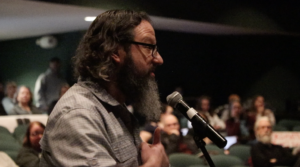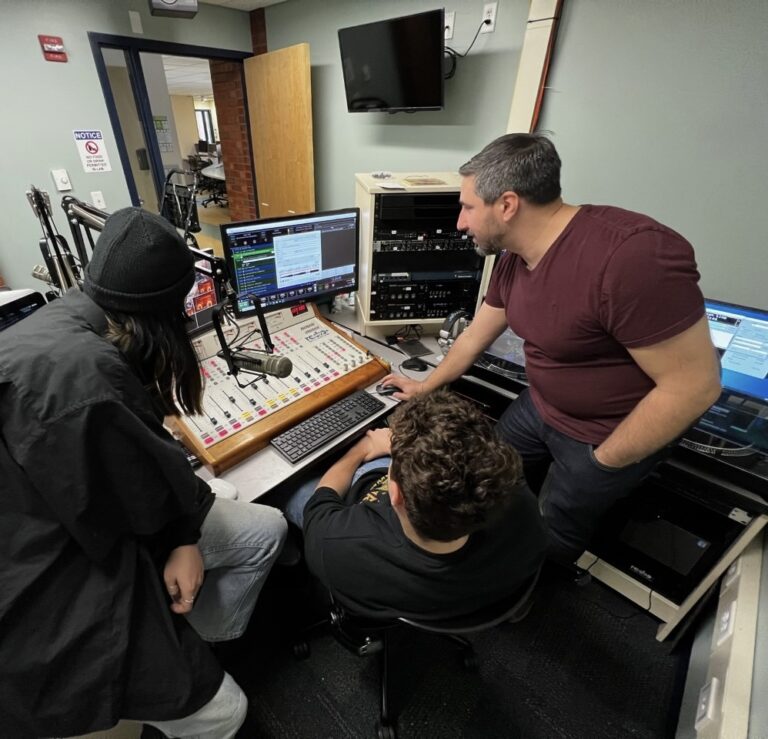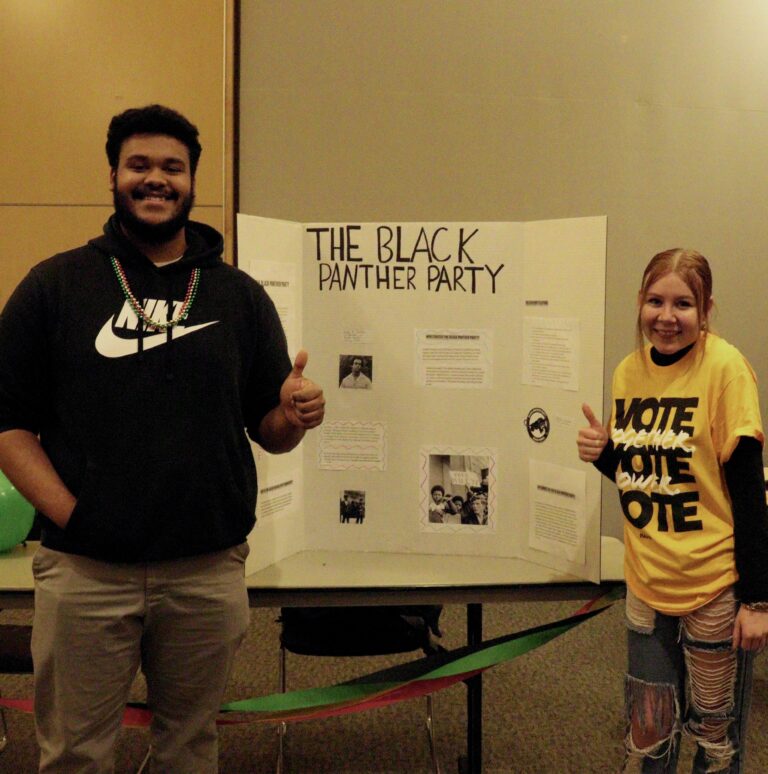VTSU library plan sparks outrage and emotion

At 3:44 p.m. Feb. 7, students, faculty and staff across all Vermont State University campuses received an email.
The email, from University President Parwinder Grewal, announced a new decision to transition to an all-digital, university-wide library and repurpose the library spaces on each campus.
That evening, individuals from every campus joined Zoom webinars with Grewal and other members of the transformation team, to ask questions and express their frustrations over the digitizing of the libraries.
Many students from the Johnson and Lyndon campuses also joined to protest the other decision announced – to move athletics on the Johnson campus from the NCAA division to the USCAA division, and to eliminate varsity athletics on the Randolph campus in favor of club sports.
And immediately, students sprang into action.
When it was announced that representatives from the transformation team would hold meetings at each campus, students began planning ways to protest – gathering in the library to make posters, putting out email lists to gather support and stay informed and making flyers for a library sit-in.
Eva Zimmerman, who previously graduated from Castleton and returned to get her nursing degree, was one of the students behind the email lists and bought poster-making materials to share with others.
“Books are irreplaceable. You can’t take books away and expect the same information to be disseminated to students. I’m scared for future students,” Zimmerman said. “I think it’s the wrong choice for Castleton and for the university system, and for Vermont. And just for students in general.”
Allison Fiske, also a nursing major, raised concerns about how this will impact neurodivergent students, as she herself is neurodivergent and greatly struggles to read in an online format.
“It’s also scary because we’re in the age of book bannings, and protests and all these things going on,” Fiske added. “And all it would take is, instead of having hard copies that can be passed around, whoever’s in control can just decide ‘we’re going to delete this file’ and that book’s no longer available to the students. And that’s a really terrible thought, that they have that sort of control.”
Junior Geanina Swanay was inspired to create flyers and help plan a sit-in following a discussion with classmates during her genetics class with professor of biology Preston Garcia.
“We were just talking about how unfair it is for them to take away all of the books and kind of turn the library into more of a social space,” Swanay said. “That’s kind of where everything came from.”
The transformation team has reassured students that they will have a say in how the spaces are used following the transition to a digitized library, but Swanay still has her doubts.
“Without the books, without the expectations that this is a library – people are quiet, people are studious and courteous of other people. It’s just going to turn into a complete social area and no studying is actually going to get done,” Swanay said.
On Friday, three days after the announcement, at the faculty and staff meeting, Garcia stood in front of the panel to voice his own concerns. Garcia acknowledged that he still thinks those on the panel that he knows, including Grewal, are good people, but that this decision should not have been made.
“I’m embarrassed to be associated with this university after this decision. And this is not a threat or an ultimatum, but I cannot stand up in an admission event and tell families to come here if this decision stands. Because I’m embarrassed that you would think that library eradication is the right plan,” Garcia said, also mentioning how the news of this change has impacted the reputation of the university on a national level.
Garcia was only one of the many faculty members, staff members and students who stood up to make statements.
One student urged the leadership team to re-think their financial priorities if those are impacting this decision. Others threatened to leave. One professor worried that his fourth-grade son, who wants to come to Castleton when he’s older, won’t have a school to come to. A facilities staff member choked up sharing about the impact of libraries and librarians on his life.
Earlier Friday morning, Grewal sent out another email to the entire university, apologizing for the way these changes were announced and to clarify that the libraries will not close entirely, and said later that fully closing the libraries was never their intention.
“The intent is to actually build a more modern library. A library of the future,” Grewal said. “The library is going to stay. The library’s going to be enhanced through digital materials and also delivery of the materials to students wherever they are. And library spaces will be further enhanced for student learning, student collaborative projects.”
Grewal also explained that, although this decision was made by teams of people with a number of opinions, he recognizes that those opinions are not broadly shared.
“One thing that we learned from this is to socialize any big decisions before they are announced, so that people have opportunity to participate,” Grewal said.
“I do take full responsibility for not communicating this decision in a manner that I should have,” Grewal added, promising to “do a better job moving forward.”
Maurice Ouimet, who has been the dean of Enrollment at Castleton since 2002 and is now the vice president of Enrollment and Admissions for VTSU, said he does not foresee this change negatively impacting enrollment and ultimately believes it is best for VTSU in the long run.
“I really do believe that the library decision is going to help us recruit and retain students going forward,” Ouimet said. “There’ll be many people that might challenge me on that, but when you look at where we’re heading in higher education, and what the expectations are for the future, and what today’s high school students are doing, this is exactly in line with what they’re doing.”
According to Ouimet, his experience in speaking with high school students through his role has shown him that, now, those students are using libraries mainly as a location to study and to “get some extra help from a librarian who can help them navigate those resources,” similar to how he sees Castleton’s library being used.
However, Natalie Simecek, who is in her fourth year and pursuing her masters in athletic training, made it clear when she spoke in front of the transformation team that she does not see these changes as positive.
“Given the recent changes to this school, I don’t even feel like the 2,000 miles I drive each way is worth it. I’ve loved this school for four years, but the thought of returning next year to finish my masters is, frankly, upsetting,” Simecek said. “I don’t want to attend a school that doesn’t even have physical books in the library. And you can damn well bet that I won’t be recommending this school to anyone involved in their college search.”
Simecek ended her statement with a plea for administration to listen to students and “do the right thing.”
English professor Flo Keyes doesn’t agree with the decision either. While some of her classes do require physical copies of books, she is also concerned about the wider implications of removing these physical materials from a college campus.
“The issue is not whether I have books for my individual classes. It’s a question of promoting a climate of literacy, climate of professionalism. People are going to laugh at a college that doesn’t have a real library,” Keyes said. “There are no books on display that might catch your eye. There are no periodicals you might just pick up to see what’s new.”
Charlotte Gerstein, who has worked as a reference and instruction librarian at Castleton since 2007, feels similarly.
“I think it was kind of a miscalculation on the part of the administration – thinking that a library is just the things on the shelf,” Gerstein said. “It has meaning beyond just the individual books sitting on the shelf. It’s symbolic. And it represents knowledge and culture and history and our connections to other humans. There’s meaning there.”
Gerstein also mentioned how the librarians working on the transformation of the libraries felt like it was a “betrayal” for this news to be dropped so suddenly. Reference librarian Miranda Axworthy echoed that point when she stood up to make a statement at the faculty and staff meeting.
“The innumerable hours of work that the library staff, including and sometimes especially those who were laid off this week, have put in was [toward] a hybrid model that had physical locations, physical collections, at all of the locations,” Axworthy said.
As of now, according to Grewal, physical copies of special collections will still remain on campus, but the decision to transition to a mostly online library remains the same. Despite the backlash, he is thankful for the engagement students and faculty have shown.
“I would like to build from here so that we work together across campuses moving forward. As I said, we will do a better job in making decisions and sharing them. But let’s stay together the way we have come together around this decision, so that we can make rapid progress towards the building of this university,” Grewal said.








